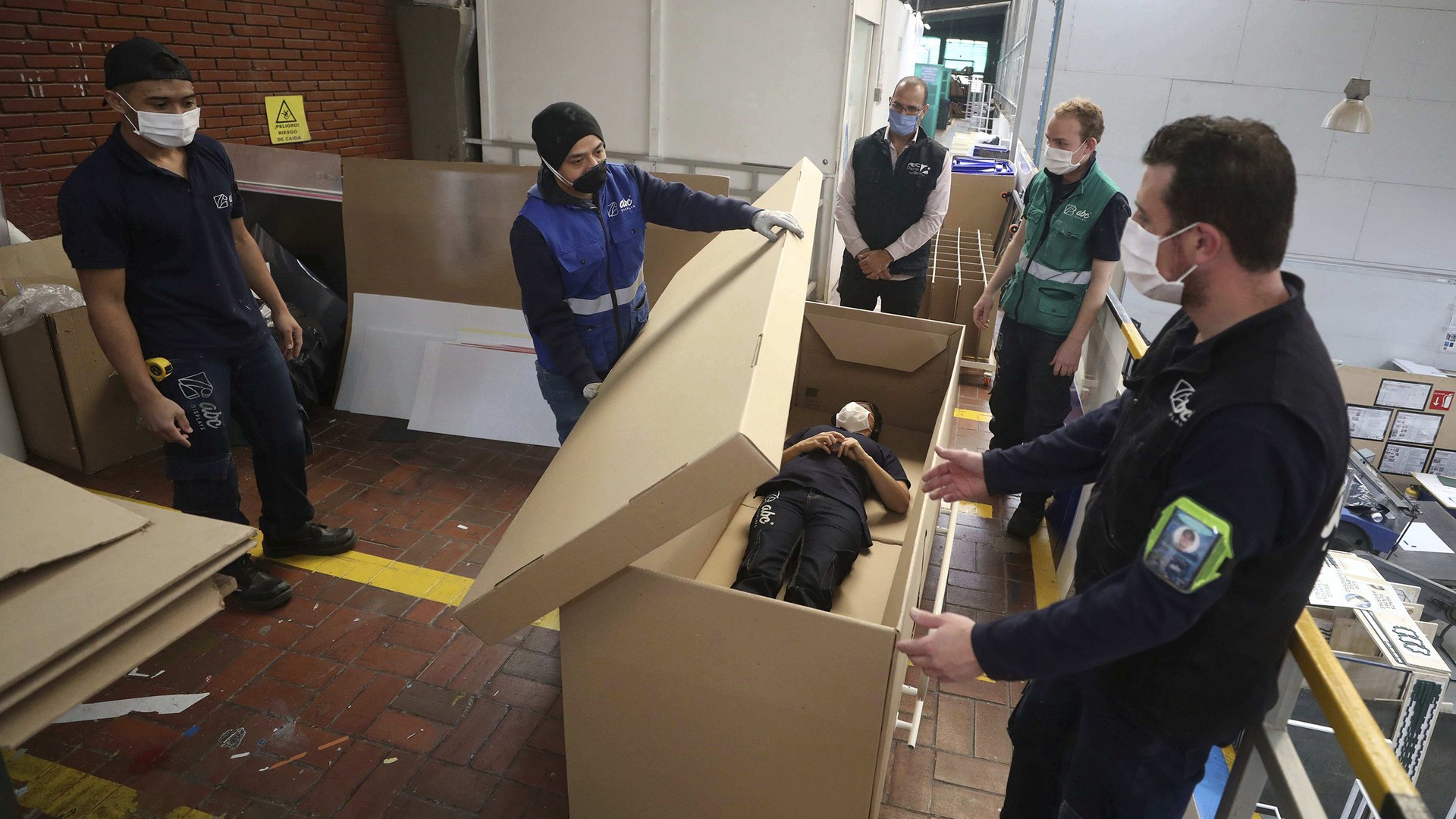RIO DE JANEIRO, BRAZIL – When the coronavirus spread to Guayaquil and the dead lay in the streets, wooden caskets were replaced by cardboard ones. In Peru, a corrugated cardboard manufacturing plant sold a thousand to two private cemeteries, although in the country they prefer melamine laminates.

In Chile, the authorities have banned them because they violate local regulations. An Argentine manufacturer complains that the governments fear “what they are going to say” and are reluctant to solve the problem of burials in an “economic and sustainable” way.
Cardboard caskets are up to three times cheaper than wooden ones, are mass-produced and do not pollute, but conflict with the impositions of the death ritual. The barriers have changed little in the countries most affected by Covid-19.
Ecuador has recorded over 4,500 victims since the pandemic broke out across the country. But between March and April, Guayas, the province with Guayaquil as its capital, produced 17,000 death certificates compared to 2,000 monthly in a regular period.
Guayaquil failed to deal with its dead, and casket manufacturers were unable to cope. The corpses piled up in homes and on doorsteps, waiting for the funeral services to collect them. The pandemic overwhelmed everyone except cardboard box manufacturers, who responded.
“We heard the news that there were people unable to bury their relatives. We decided, as a company, precisely as we did in the 2016 earthquake, to manufacture cardboard caskets,” Gonzalo Velázquez, manager of Papelera Nacional, says.
Seven of the sector’s largest companies donated 5,000 cardboard caskets to coronavirus victims in about 20 cities. The cardboard companies hired more employees and, for three weeks, dedicated a production line to cardboard caskets. When the pandemic passes, however, they will shut down the machines.
“Nobody wants to bury a relative in a cardboard box, that was a way to help in a disastrous situation, as in the earthquake,” he acknowledges.
The municipality of Guayaquil, in fact, was criticized when it announced the donation of cardboard caskets to the victims’ families. It was undignified, people protested. Alejandro Faks, an Argentine citizen, has been fighting the authorities’ apprehension of “what they’re going to say” for the past 10 years.
“I have meetings with the government of the city of Buenos Aires and Tucumán (north). They asked me if I’m still standing, they wanted to know if I’m available and I’m still selling. But they are waiting for the hecatombe to buy the next day. They are afraid of what people might say,” Faks says.
The entrepreneur owns Restbox, the only company in Latin America exclusively dedicated to designing and manufacturing cardboard caskets. Since the start of the pandemic, he’s doubled his sales to funeral homes that he regularly supplies in Argentina.
He has also received dozens of calls from abroad, but no actual orders. Faks says his caskets cost only US$40 (R$213), but double in value when you add up the export cost. Cardboard caskets do not pollute because they contain no enamels or varnishes, and the manufacturing capacity is virtually unlimited. The issue to be addressed is the “culture shock,” says Fask, which proposes as an alternative placing the cardboard casket inside a rented wooden one or covering it with a papal cloak.
“Most people don’t like the look of cardboard because it seems like they’re carrying goods, like food. In order to avoid causing visual impact, we are planning to print wood or flower textures on it,” says Cristian Cáceres, project manager of the Chilean cardboard manufacturing company Paper Project. The company tried to sell cardboard caskets, but was faced with local waterproofing and airtight sealing standards.
“Wood on its own is not waterproof either. It’s the metal box inside the casket – made of brass, sealed and welded – that is easy to make and process. Cost and delay lie in wooden caskets, which in Chile are virtually handcrafted by master carpenters,” Cáceres explains. A cardboard casket in Chile costs about US$123 (R$665), while a wooden one costs about US$370 (R$2,000). Paper Project has been fighting for years to be part of the funerary business. Only after the explosion of Covid-19 in China did the company expedite the project. Now, it is conditional on official authorization.
With over 285,000 positive cases, Peru is the second country in Latin America in numbers of people infected with coronavirus, behind Brazil. Of the 9,600 deaths recorded, at least 3,900 occurred in Lima, where the number could be three times higher if, as in Ecuador, the rising death toll is considered.
A representative of the corrugated cardboard company Carvimsa in Lima says that since the start of April they have delivered 1,000 cardboard caskets to Mapfre and Campofe, which run private cemeteries, at a cost of US$100 each. “We are also looking for an institution that really is in need, to donate these caskets,” says the executive. The Carvimsa models can hold up to 100 kilograms, measure 1.90 centimeters in length and weigh 13 kilograms.
Lima’s main crematorium had cremated more than 5,000 bodies by June 23rd, most of them in melamine laminated caskets (MDF). “We use relatively few cardboard caskets for a very simple reason: cost. My brother manufactures them in MDF and sells them to me cheaper than cardboard,” says Henry Gonzales, general manager of Piedrangel, the funeral director that recorded the highest number of Covid-19 deaths in the Peruvian capital.
Gonzales bought the cardboard caskets from people who imported the product and from a Peruvian corrugated cardboard manufacturer. “I thought about importing them, but it’s taking too long. My brother wasn’t involved in that, he manufactured furniture, but at the start of the pandemic we didn’t have enough caskets for that much demand, so he adjusted to the material,” he explains. Since the start of the pandemic, the seven ovens Gonzales manages in Lima have worked 24 hours a day to cremate sixty bodies.
Source: El País

